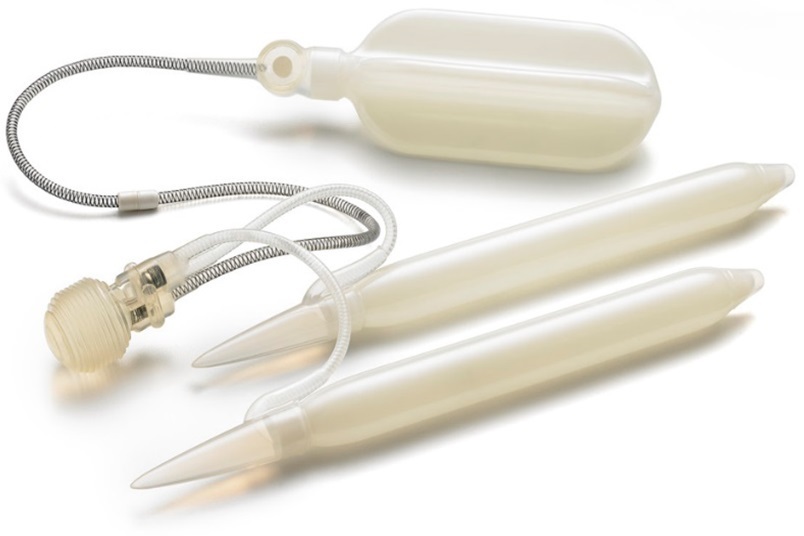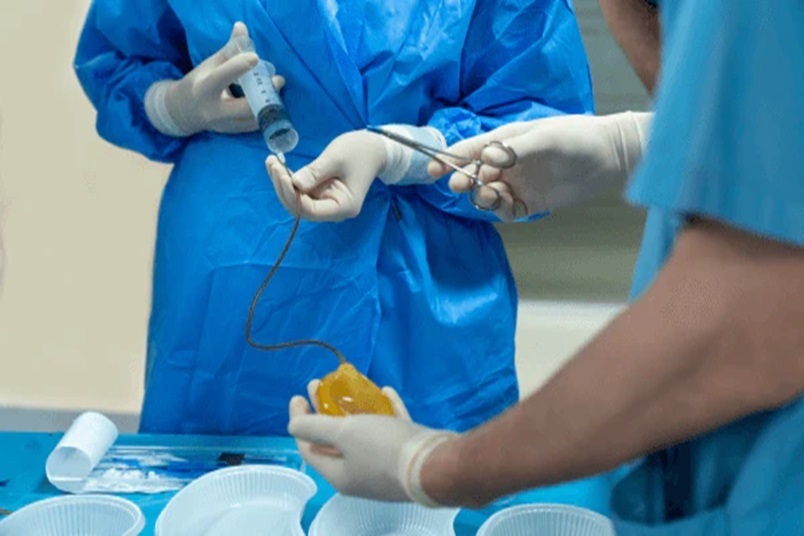Blog >Treatment for Erectile Dysfunction: Can Penile Implants Help?
Treatment for Erectile Dysfunction: Can Penile Implants Help?

Erectile dysfunction (ED) is a prevalent condition affecting men, characterized by the consistent inability to achieve or maintain sufficient erection for sexual intercourse. This often leads to emotional distress and relationship issues. When traditional treatments such as medications, vacuum devices, or injections have proven ineffective, penile implants emerge as a surgical intervention offering a solution. These penile implants, available in inflatable and semi-rigid types, aim to restore natural erectile function. In this blog, we will guide on how penile implants help in overcoming the challenges posed by ED.
Causes of Erectile Dysfunction

Erectile dysfunction (ED) is a multifaceted condition caused by a variety of physical, psychological, and lifestyle factors. Understanding the definite cause is necessary for accurate diagnosis and effective treatment. The following are the various causes of ED:
Underlying medical conditions: Chronic diseases such as diabetes, hypertension, and cardiovascular issues can contribute to ED by affecting blood flow and nerve function necessary for erections.
Neurological disorders: Conditions such as multiple sclerosis, Parkinson’s disease, and spinal cord injuries can disrupt the communication between the brain and the reproductive system, leading to ED.
Hormonal imbalances: An imbalance in hormones, particularly low testosterone levels, can impact sexual function and contribute to erectile difficulties.
Vascular issues: Conditions affecting blood vessels, including atherosclerosis (hardening of the arteries), can impede blood flow to the penis, a crucial factor for achieving and maintaining an erection.
Psychological factors: Stress, anxiety, depression, and other mental health issues can significantly impact sexual performance. Psychological factors often exacerbate ED, creating a cycle of stress and sexual dysfunction.
Medications: Some medications, such as antidepressants, antihypertensives, and certain prostate cancer treatments, may have side effects that contribute to ED.
Lifestyle choices: Unhealthy lifestyle habits, including smoking, excessive alcohol consumption, and substance abuse, can contribute to ED by affecting overall health and blood circulation.
Age-related factors: While aging itself doesn’t cause ED, it is associated with an increased likelihood of developing underlying health conditions that contribute to sexual dysfunction.
Relationship issues: Problems within a relationship, communication issues, or sexual dissatisfaction may contribute to ED. Emotional intimacy plays a crucial role in sexual health.
Penile Implants as a treatment for Erectile Dysfunction

Penile implants, also known as penile prostheses, are surgical devices used to treat erectile dysfunction (ED) when other treatments have failed. This treatment approach involves surgically placing devices into the penis to enable an erection.
Types of Penile Implants
There are two main types of penile implants: inflatable and semi-rigid.
Inflatable penile implants: These implants consist of cylinders filled with fluid and a pump placed inside the scrotum. When activated, the pump transfers fluid into the cylinders, creating an erection. This design allows for a more natural flaccid state.
Semi-rigid penile implants: Unlike inflatable implants, semi-rigid implants are always firm but can be manually positioned for intimacy. They consist of flexible rods implanted into the penis, allowing for a more straightforward surgical procedure.
Candidates for Penile Implants

The selection of candidates for penile implant surgery involves a careful evaluation of various factors to ensure the procedure’s appropriateness and success. The following criteria are considered:
Treatment failure: Candidates typically undergo penile implant surgery when other interventions for erectile dysfunction, such as oral medications, vacuum erection devices, or injections, have proven ineffective or are not well-tolerated.
Psychological evaluation: Psychological stability is essential for a successful outcome. Candidates undergo thorough psychological assessments to ensure realistic expectations, emotional preparedness, and the ability to cope with the changes associated with the surgery.
Health status: Overall health is a critical factor. Candidates should be in good general health, and free from conditions that might compromise the success of the surgery or increase the risk of complications. Conditions such as uncontrolled diabetes or active infections may need to be addressed before considering the procedure.
Absence of anatomical abnormalities: The absence of anatomical abnormalities or deformities in the penis that could complicate the implantation process is important. Any pre-existing issues may require correction before proceeding with the surgery.
Partner involvement: Involving the partner in the decision-making process is often encouraged. Open communication and shared expectations between the patient and their partner can contribute to better postoperative satisfaction.
Age consideration: While age itself is not a strict criterion, overall health is more critical. Older candidates should be in good health to ensure the surgery’s success and reduce potential risks.
Procedure of Penile Implants

The surgical procedure for penile implants, also known as penile prosthesis surgery, involves several key steps to ensure the proper placement of the implant and its functionality. The following are the various steps:
Anaesthesia: The surgery begins with the administration of anaesthesia to ensure the patient is unconscious and pain-free during the procedure. General anaesthesia is commonly used.
Incision: Once the patient is under anaesthesia, the surgeon makes a small incision, usually at the base of the penis or in the scrotum. The location may vary depending on the type of implant and the surgeon’s preference.
Exposure of corpora cavernosa: The surgeon carefully exposes the corpora cavernosa (spongy tissue of the penis), which are the two chambers in the penis responsible for erections. These chambers will accommodate the implant.
Insertion of implant: For inflatable penile implants, the surgeon places cylinders filled with fluid into the corpora cavernosa. A pump is typically implanted in the scrotum and a reservoir is positioned elsewhere in the body, often in the lower abdomen. In case of semi-rigid implants, flexible rods are inserted into the corpora cavernosa. These rods provide a constant level of rigidity to the penis.
Securing the implant: The surgeon ensures proper positioning and secures the implant components to prevent unnecessary movement or displacement. Care is taken to mimic the natural angle and appearance of the erect penis.
Closing incisions: After placing the implant, the surgeon closes the incisions with dissolvable sutures. The incisions are designed to be inconspicuous and minimize scarring.
Postoperative monitoring: The patient is closely monitored during the immediate postoperative period to manage pain, ensure proper healing, and address any immediate concerns.
Follow-up care: Postoperative care involves follow-up appointments to monitor the patient’s recovery and assess the functionality of the implant. This includes checking for any signs of infection and confirming that the implant is working as intended.
The entire procedure is performed with precision to minimize complications and ensure optimal outcomes. While penile implant surgery is generally considered safe and effective, as with any surgical procedure, there are potential risks and complications. Individuals considering this intervention should engage in thorough discussions with their healthcare providers to understand the procedure, its potential outcomes, and any associated risks.
Benefits of Penile Implants

Penile implants offer several benefits for individuals with erectile dysfunction (ED) who have not found success with other treatments. Here are some of the advantages:
Restored sexual function: Penile implants are highly effective in restoring erectile function, allowing individuals to achieve and maintain erections suitable for sexual intercourse.
Spontaneity in sexual activity: Unlike some other treatments for ED, such as medications or vacuum devices, penile implants allow for spontaneity in sexual activities. There is no need to plan or wait for the effects to take place.
Improved quality of life: Many patients report a significant improvement in their overall quality of life after penile implant surgery. Restored sexual function can positively impact mental and emotional well-being.
Natural appearance and feel: The appearance and feel of the penis with a penile implant can closely mimic a natural erection. This contributes to a more satisfying and authentic sexual experience for both the individual and their partner.
Long-term solution: Penile implants offer a long-term solution for ED, providing consistent results over time. Unlike medications, which may lose efficacy or cause side effects, the implant provides reliable and durable results.
Relationship benefits: Improved sexual function often leads to enhanced intimacy and satisfaction within relationships. Penile implants can contribute to a healthier and more fulfilling sexual connection between partners.
Psychological Well-Being: Overcoming the challenges of ED through penile implant surgery can positively impact a person’s self-esteem and confidence. Addressing the psychological aspects of sexual health is important for overall well-being.
In conclusion, penile implants serve as a highly effective and reliable solution for individuals facing persistent erectile dysfunction. With distinct types, including inflatable and semi-rigid, these implants restore natural sexual function, providing spontaneity and significantly improving the quality of life. High satisfaction rates, coupled with the ability to address both physiological and psychological aspects of ED is the highlight of penile implants. As medical advancements continue, penile implants stand as a valuable option in the comprehensive approach to managing erectile dysfunction.
AndroNeo, at Bangalore, India, excels in treating erectile dysfunction, offering state-of-the-art solutions, including the expert placement of penile implants. Renowned for their latest medical expertise, AndroNeo ensures personalized care, high success rates, and patient satisfaction. With a commitment to restoring sexual health, AndroNeo Hospitals stands out as a premier choice for those seeking effective treatment for erectile dysfunction through penile implant procedures.
Recent Post
-
Penile Implant Surgery: A Permanent Solution to Erectile Dysfunction from the expert Andrologist in Bangalore
-
Testosterone – why is it so important
-
Bengaluru’s Leading Expert in Andrology (Male Fertility and Sexual Health) and Prosthetic Urology – Dr Pramod Krishnappa
-
Varicocele – The Hidden Cause of Male Infertility
-
No Sperm and Its Link to Genetic Factors: An Exploratory Guide
Related Post
Penile Implant Surgery: A Permanent Solution to Erectile Dysfunction from the expert Andrologist in Bangalore
Penile Implant Surgery: A Permanent Solution to Erectile Dysfunction from the expert Andrologist in Bangalore Living with erectile dysfunction (ED) is not only a physical
Read More »
Testosterone – why is it so important
Testosterone – why is it so important Testosterone hormone is one of the most important hormones in our body, it is primarily a male hormone
Read More »
Bengaluru’s Leading Expert in Andrology (Male Fertility and Sexual Health) and Prosthetic Urology – Dr Pramod Krishnappa
Bengaluru’s Leading Expert in Andrology (Male Fertility and Sexual Health) and Prosthetic Urology – Dr Pramod Krishnappa Overview Dr. Pramod Krishnappa is an exceptional Andrology
Read More »
Varicocele – The Hidden Cause of Male Infertility
Varicocele_ The Hidden Cause of Male Infertility Infertility in men is a problem for millions of couples around the world, and one of the common
Read More »
No Sperm and Its Link to Genetic Factors: An Exploratory Guide
No Sperm and Its Link to Genetic Factors: An Exploratory Guide Azoospermia, a leading cause of male infertility, occurs when a man’s ejaculate (semen) does
Read More »
Penile Implant For Erectile Dysfunction: Preparation, During & After Surgery
Penile Implant For Erectile Dysfunction: Preparation, During & After Surgery A penile implant, also called a penile prosthesis, is a treatment method used to treat
Read More »

Erectile dysfunction (ED) is a prevalent condition affecting men, characterized by the consistent inability to achieve or maintain sufficient erection for sexual intercourse. This often leads to emotional distress and relationship issues. When traditional treatments such as medications, vacuum devices, or injections have proven ineffective, penile implants emerge as a surgical intervention offering a solution. These penile implants, available in inflatable and semi-rigid types, aim to restore natural erectile function. In this blog, we will guide on how penile implants help in overcoming the challenges posed by ED.
Causes of Erectile Dysfunction

Erectile dysfunction (ED) is a multifaceted condition caused by a variety of physical, psychological, and lifestyle factors. Understanding the definite cause is necessary for accurate diagnosis and effective treatment. The following are the various causes of ED:
Underlying medical conditions: Chronic diseases such as diabetes, hypertension, and cardiovascular issues can contribute to ED by affecting blood flow and nerve function necessary for erections.
Neurological disorders: Conditions such as multiple sclerosis, Parkinson’s disease, and spinal cord injuries can disrupt the communication between the brain and the reproductive system, leading to ED.
Hormonal imbalances: An imbalance in hormones, particularly low testosterone levels, can impact sexual function and contribute to erectile difficulties.
Vascular issues: Conditions affecting blood vessels, including atherosclerosis (hardening of the arteries), can impede blood flow to the penis, a crucial factor for achieving and maintaining an erection.
Psychological factors: Stress, anxiety, depression, and other mental health issues can significantly impact sexual performance. Psychological factors often exacerbate ED, creating a cycle of stress and sexual dysfunction.
Medications: Some medications, such as antidepressants, antihypertensives, and certain prostate cancer treatments, may have side effects that contribute to ED.
Lifestyle choices: Unhealthy lifestyle habits, including smoking, excessive alcohol consumption, and substance abuse, can contribute to ED by affecting overall health and blood circulation.
Age-related factors: While aging itself doesn’t cause ED, it is associated with an increased likelihood of developing underlying health conditions that contribute to sexual dysfunction.
Relationship issues: Problems within a relationship, communication issues, or sexual dissatisfaction may contribute to ED. Emotional intimacy plays a crucial role in sexual health.
Penile Implants as a treatment for Erectile Dysfunction

Penile implants, also known as penile prostheses, are surgical devices used to treat erectile dysfunction (ED) when other treatments have failed. This treatment approach involves surgically placing devices into the penis to enable an erection.
Types of Penile Implants
There are two main types of penile implants: inflatable and semi-rigid.
Inflatable penile implants: These implants consist of cylinders filled with fluid and a pump placed inside the scrotum. When activated, the pump transfers fluid into the cylinders, creating an erection. This design allows for a more natural flaccid state.
Semi-rigid penile implants: Unlike inflatable implants, semi-rigid implants are always firm but can be manually positioned for intimacy. They consist of flexible rods implanted into the penis, allowing for a more straightforward surgical procedure.
Candidates for Penile Implants

The selection of candidates for penile implant surgery involves a careful evaluation of various factors to ensure the procedure’s appropriateness and success. The following criteria are considered:
Treatment failure: Candidates typically undergo penile implant surgery when other interventions for erectile dysfunction, such as oral medications, vacuum erection devices, or injections, have proven ineffective or are not well-tolerated.
Psychological evaluation: Psychological stability is essential for a successful outcome. Candidates undergo thorough psychological assessments to ensure realistic expectations, emotional preparedness, and the ability to cope with the changes associated with the surgery.
Health status: Overall health is a critical factor. Candidates should be in good general health, and free from conditions that might compromise the success of the surgery or increase the risk of complications. Conditions such as uncontrolled diabetes or active infections may need to be addressed before considering the procedure.
Absence of anatomical abnormalities: The absence of anatomical abnormalities or deformities in the penis that could complicate the implantation process is important. Any pre-existing issues may require correction before proceeding with the surgery.
Partner involvement: Involving the partner in the decision-making process is often encouraged. Open communication and shared expectations between the patient and their partner can contribute to better postoperative satisfaction.
Age consideration: While age itself is not a strict criterion, overall health is more critical. Older candidates should be in good health to ensure the surgery’s success and reduce potential risks.
Procedure of Penile Implants

The surgical procedure for penile implants, also known as penile prosthesis surgery, involves several key steps to ensure the proper placement of the implant and its functionality. The following are the various steps:
Anaesthesia: The surgery begins with the administration of anaesthesia to ensure the patient is unconscious and pain-free during the procedure. General anaesthesia is commonly used.
Incision: Once the patient is under anaesthesia, the surgeon makes a small incision, usually at the base of the penis or in the scrotum. The location may vary depending on the type of implant and the surgeon’s preference.
Exposure of corpora cavernosa: The surgeon carefully exposes the corpora cavernosa (spongy tissue of the penis), which are the two chambers in the penis responsible for erections. These chambers will accommodate the implant.
Insertion of implant: For inflatable penile implants, the surgeon places cylinders filled with fluid into the corpora cavernosa. A pump is typically implanted in the scrotum and a reservoir is positioned elsewhere in the body, often in the lower abdomen. In case of semi-rigid implants, flexible rods are inserted into the corpora cavernosa. These rods provide a constant level of rigidity to the penis.
Securing the implant: The surgeon ensures proper positioning and secures the implant components to prevent unnecessary movement or displacement. Care is taken to mimic the natural angle and appearance of the erect penis.
Closing incisions: After placing the implant, the surgeon closes the incisions with dissolvable sutures. The incisions are designed to be inconspicuous and minimize scarring.
Postoperative monitoring: The patient is closely monitored during the immediate postoperative period to manage pain, ensure proper healing, and address any immediate concerns.
Follow-up care: Postoperative care involves follow-up appointments to monitor the patient’s recovery and assess the functionality of the implant. This includes checking for any signs of infection and confirming that the implant is working as intended.
The entire procedure is performed with precision to minimize complications and ensure optimal outcomes. While penile implant surgery is generally considered safe and effective, as with any surgical procedure, there are potential risks and complications. Individuals considering this intervention should engage in thorough discussions with their healthcare providers to understand the procedure, its potential outcomes, and any associated risks.
Benefits of Penile Implants

Penile implants offer several benefits for individuals with erectile dysfunction (ED) who have not found success with other treatments. Here are some of the advantages:
Restored sexual function: Penile implants are highly effective in restoring erectile function, allowing individuals to achieve and maintain erections suitable for sexual intercourse.
Spontaneity in sexual activity: Unlike some other treatments for ED, such as medications or vacuum devices, penile implants allow for spontaneity in sexual activities. There is no need to plan or wait for the effects to take place.
Improved quality of life: Many patients report a significant improvement in their overall quality of life after penile implant surgery. Restored sexual function can positively impact mental and emotional well-being.
Natural appearance and feel: The appearance and feel of the penis with a penile implant can closely mimic a natural erection. This contributes to a more satisfying and authentic sexual experience for both the individual and their partner.
Long-term solution: Penile implants offer a long-term solution for ED, providing consistent results over time. Unlike medications, which may lose efficacy or cause side effects, the implant provides reliable and durable results.
Relationship benefits: Improved sexual function often leads to enhanced intimacy and satisfaction within relationships. Penile implants can contribute to a healthier and more fulfilling sexual connection between partners.
Psychological Well-Being: Overcoming the challenges of ED through penile implant surgery can positively impact a person’s self-esteem and confidence. Addressing the psychological aspects of sexual health is important for overall well-being.
In conclusion, penile implants serve as a highly effective and reliable solution for individuals facing persistent erectile dysfunction. With distinct types, including inflatable and semi-rigid, these implants restore natural sexual function, providing spontaneity and significantly improving the quality of life. High satisfaction rates, coupled with the ability to address both physiological and psychological aspects of ED is the highlight of penile implants. As medical advancements continue, penile implants stand as a valuable option in the comprehensive approach to managing erectile dysfunction.
AndroNeo, at Bangalore, India, excels in treating erectile dysfunction, offering state-of-the-art solutions, including the expert placement of penile implants. Renowned for their latest medical expertise, AndroNeo ensures personalized care, high success rates, and patient satisfaction. With a commitment to restoring sexual health, AndroNeo Hospitals stands out as a premier choice for those seeking effective treatment for erectile dysfunction through penile implant procedures.
Recent Post
- Penile Implant Surgery: A Permanent Solution to Erectile Dysfunction from the expert Andrologist in Bangalore
- Testosterone – why is it so important
- Bengaluru’s Leading Expert in Andrology (Male Fertility and Sexual Health) and Prosthetic Urology – Dr Pramod Krishnappa
- Varicocele – The Hidden Cause of Male Infertility
- No Sperm and Its Link to Genetic Factors: An Exploratory Guide
Related Post
Penile Implant Surgery: A Permanent Solution to Erectile Dysfunction from the expert Andrologist in Bangalore
Penile Implant Surgery: A Permanent Solution to Erectile Dysfunction from the expert Andrologist in Bangalore Living with erectile dysfunction (ED) is not only a physical
Testosterone – why is it so important
Testosterone – why is it so important Testosterone hormone is one of the most important hormones in our body, it is primarily a male hormone
Bengaluru’s Leading Expert in Andrology (Male Fertility and Sexual Health) and Prosthetic Urology – Dr Pramod Krishnappa
Bengaluru’s Leading Expert in Andrology (Male Fertility and Sexual Health) and Prosthetic Urology – Dr Pramod Krishnappa Overview Dr. Pramod Krishnappa is an exceptional Andrology
Varicocele – The Hidden Cause of Male Infertility
Varicocele_ The Hidden Cause of Male Infertility Infertility in men is a problem for millions of couples around the world, and one of the common
No Sperm and Its Link to Genetic Factors: An Exploratory Guide
No Sperm and Its Link to Genetic Factors: An Exploratory Guide Azoospermia, a leading cause of male infertility, occurs when a man’s ejaculate (semen) does
Penile Implant For Erectile Dysfunction: Preparation, During & After Surgery
Penile Implant For Erectile Dysfunction: Preparation, During & After Surgery A penile implant, also called a penile prosthesis, is a treatment method used to treat
